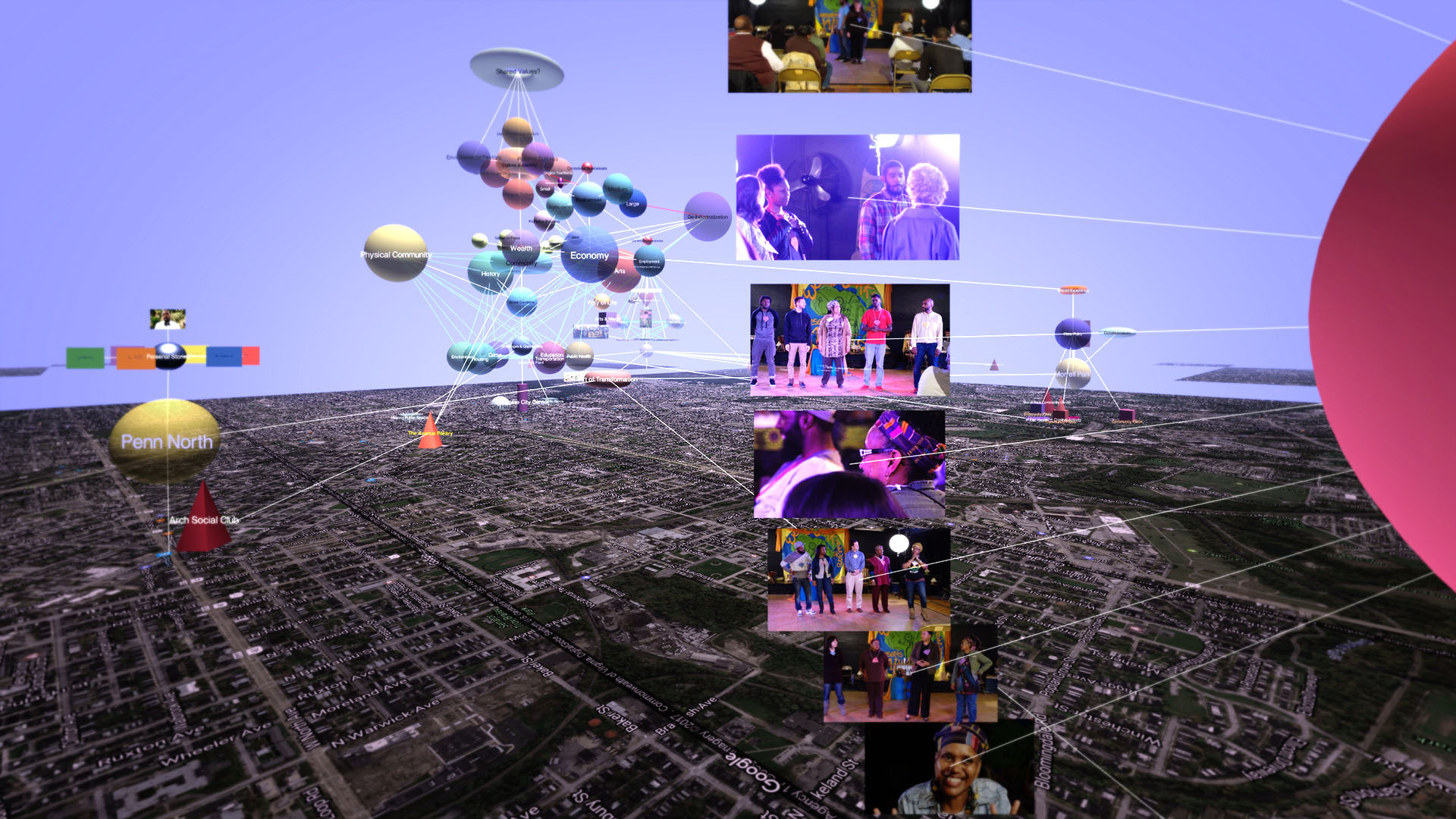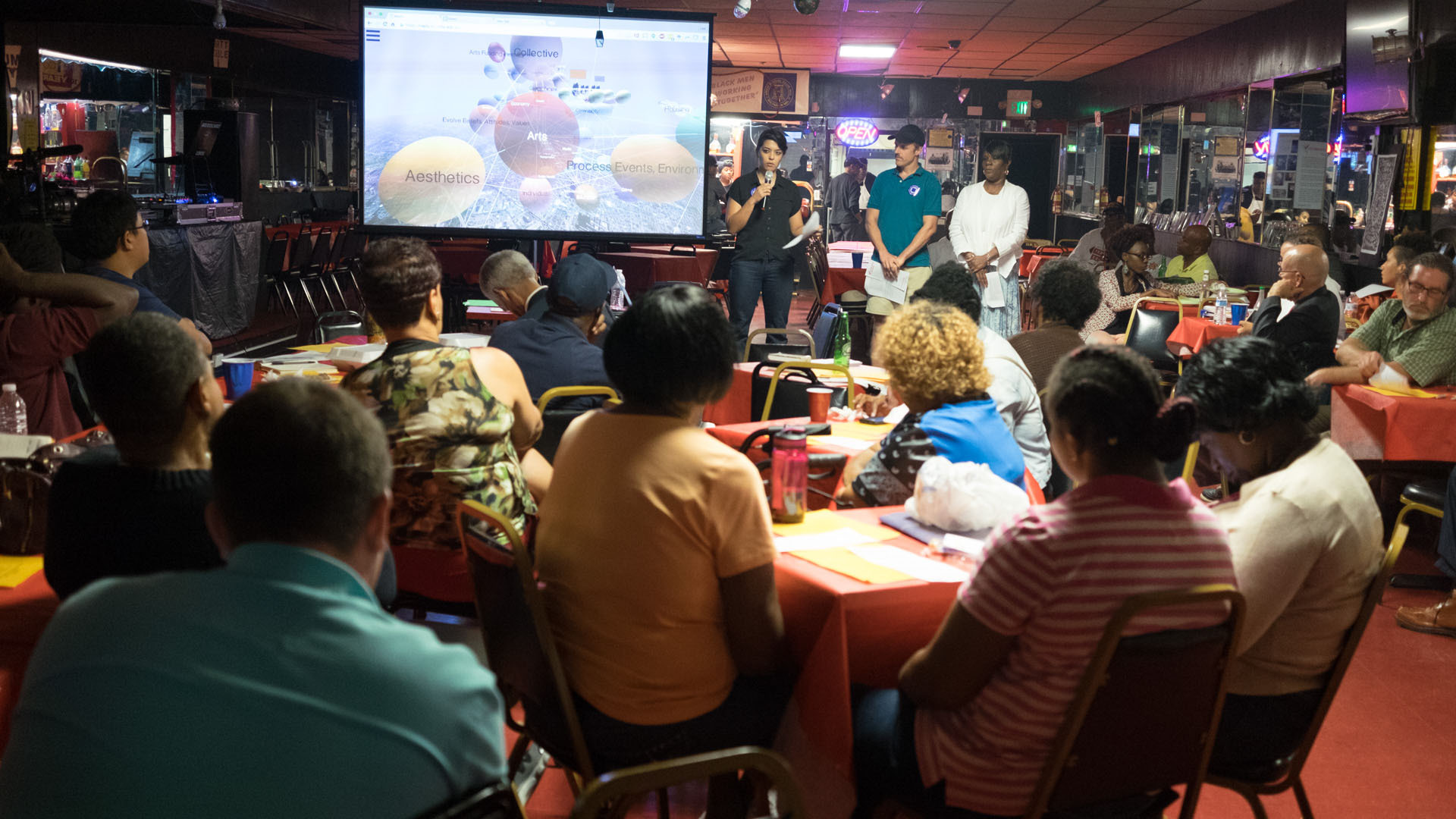A Community-Based Art Practice for Social Change

Art of Transformation (AoT) is a community-based media project designed to facilitate positive socio-cultural, structural, and systemic changes in Baltimore and beyond. It may seem strange to think of the arts as levers of change, but it’s an ancient idea that is now resurfacing and getting a lot of attention due to the lack of progress that more technocratic, top-down strategies have made on a wide range of vexing societal issues.
The idea for AoT emerged in 2016 from a group of university students, faculty and staff, and community partners called the Baltimore Imagining Group (BIG, made up of those who had planned UMBC’s hosting of the Imagining America conference in 2015. While planning the conference, the group had promised that their community work would not end there. The plan was to use new technologies to create a virtual, online version of Baltimore and to fill it with the voices, artworks, and cultural artifacts from the local cultures of communities around the city. The goal was to raise the visibility of local cultures in order to change the dominant and distorted historical narratives that kept unjust policies in place and reduced investment in local neighborhoods. Such stories are often confirmed by news stories that only cover certain communities when there is a problem.
The idea of engaging in cultural practices, or what West Baltimore community activist Denise Johnson calls, community organizing, instead of more traditional forms of lobbying government or organizing protests, is based on a belief in the power of culture to shape individual political decisions. Cultural affinity influences people to make the choices they feel people who are culturally similar to them are making. People don’t want to alienate those they associate with. Cultural narratives are arguably easier to change than other influential factors like the environment, genetics, or the economy. We can change culture with a song, a book, a film, a new gadget, or more recently, a tweet. (Like it or not, Twitter is an art form.) The arts can be thought of as the language of culture because they translate situations and events into human terms that engage us emotionally, intellectually, and aesthetically. They help us see where we are and where we are going and do so in ways that move us and become part of us. So, in short, engage the arts to change culture, and consequently, the decisions people make including which leaders and policies to support.
Once the Art of Transformation project had been conceived and agreed upon by the BIG group, the first stage began. In 2016 IRC researchers and graduate students from the Department of Visual Arts’ IMDA program worked with community partners in four Baltimore communities: Walbrook, Penn North, Morrell Park, and Brooklyn/Curtis Bay. We began filming interviews with people in different neighborhoods, learning what it is like to be who they are and living where they do. The films were put into the IRC’s new MapTu software, where they were placed on a virtual map of the city, in a 3D space. The content of the interviews was then diagrammed so that it could be visualized conceptually in that same virtual space (see image above). The IRC and community partners have applied for further funding for a second stage in which UMBC faculty and students will work through community-based cultural organizations to help community members do all the collecting of stories and artifacts, and upload them into the virtual Baltimore space, themselves. Ultimately, communities across the city and beyond will be able to engage in the same practice, defining, for all stakeholders, who they are and who they want to be on their own terms. In the final stage of the project, communities will use other tools in the software to connect with one another, build a collaborative model of Baltimore’s assets, challenges, and aspirations, and plan the strategies that will get us there.

For more about the project, read “The Art of Transformation: Cultural Organizing by Reinventing Media”.
Researchers and Creators
Faculty Leads: Lee Boot, Beverly Bickel
Faculty Collaborators: Stephen Bradley, David Hoffman, Alan Kreizenbeck, Kathy O’Dell, Bill Shewbridge, Joby Taylor
Student Collaborators: Frank Anderson, Sherella Cupid, Christopher Kojzar, Tahira Mahdi, Leah Michaels, Mandy Morrison, Jaclin Paul, Adan Rodriguez
Community Partners: Denise Johnson, Culture Works/ US Department of Arts and Culture/ Arch Social Club, James Hamlin, Avenue Bakery/ Royal Theater and Community Heritage Foundation, Rashida-Forman Bey, Kaye Lawal, Wombwork Productions, Dale Smith, Morrell Park Community Center, Carol McCoy, Morrell Park Community Association, Belinda Fraley Huesman, Chesapeake Arts Center, Michael Scott, Equity Matters
Sponsors
UMBC, through the Breaking Ground organization and support for the IRC from the Robert W. Deutsch Foundation;
The National Endowment for the Humanities, as part of a larger award for Baltimore Stories, a project initiated by Sheri Parks at the University of Maryland, College Park.
Imaging Research Center, UMBC © 2024